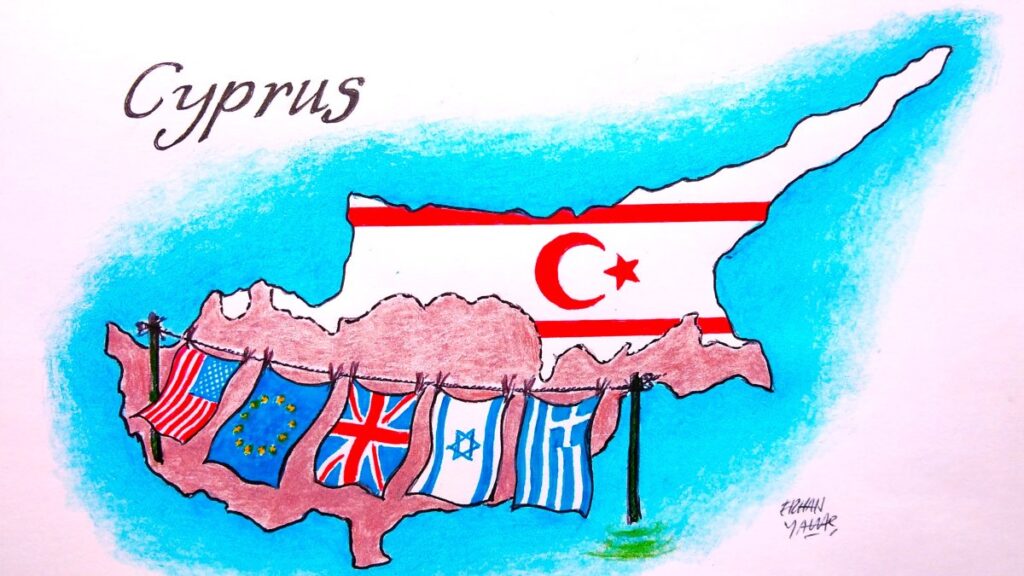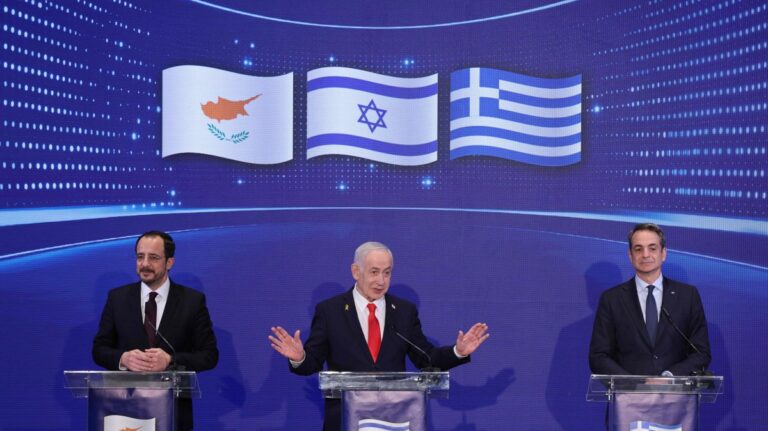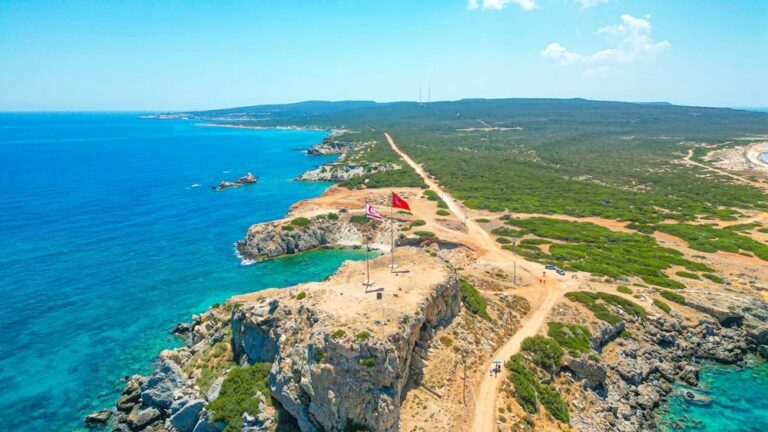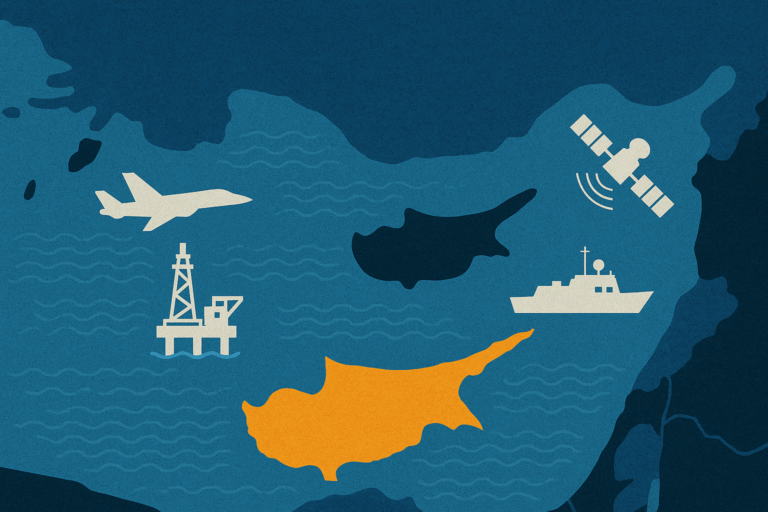There is a rule in international politics: Those who believe the Middle East is the epicenter of unrest have not yet grasped the geopolitical reality of Cyprus. The island, often romanticized as a cultural crossroads, has long since transformed into a strategic chess piece, moved at will by external powers. While global headlines are fixated on Gaza, an equally concerning dynamic is unfolding in Cyprus – one that echoes historical developments in Palestine and carries profound implications for Türkiye and Turkish Cypriots.
Greece, Israel and Cyprus
As geopolitical alignments in the Eastern Mediterranean solidify, the deepening cooperation between Greece, the Greek Cypriot administration and Israel is no longer a secret. Joint military exercises, cooperation in natural gas projects and the expansion of strategic bases illustrate a partnership that extends beyond security, forming a geopolitical bulwark against Türkiye. This strategy is further reinforced by Western states and institutions that seek to curtail Türkiye’s regional influence, restricting it to its coastal waters and limiting its geopolitical and economic reach.
In this broader framework, Cyprus has become an increasingly critical hub for Western military operations. Among the most prominent actors, the United Kingdom – maintaining two sovereign military bases on the island since Cyprus’ independence – has long provided the United States with strategic access and, more recently, Israel as well. Additionally, the Greek Cypriot administration has offered Israel the use of its bases for military operations in Gaza, further embedding itself within the hegemonic military strategy. The recent expansion of the Andreas Papandreou Air Base in Paphos to NATO standards with U.S. funding serves as the clearest signal yet: Cyprus has transitioned from a passive actor to a battleground for Western power projection.
Also, Israeli intelligence agencies have increased their presence in Cyprus, particularly in the south. Reports indicate active Israeli intelligence operations within key infrastructure, including airports and security sectors, under the pretext of counterterrorism. However, history shows that intelligence networks rarely confine themselves to their stated missions. Surveillance, economic espionage and military coordination are all plausible components of a broader strategy integrating Cyprus into Israel’s regional defense calculus.
Economic infiltration
While Greek Cypriot officials publicly declare Israel as their “neighbor” to justify this alignment, a more subtle and strategic transformation is unfolding in the Turkish Cypriot north – Türkiye’s protege. Israeli investors are acquiring key coastal properties and tourism infrastructure, positioning Cyprus as both a strategic outpost and an economic stronghold, mirroring tactics observed in other contested regions.
Territorial expansion does not always occur through military force; sometimes, the quiet redirection of capital suffices. Israeli investment in the Turkish Republic of Northern Cyprus (TRNC) is steadily increasing, raising concerns about its long-term political implications. Dismissing this as mere market activity overlooks historical precedents – similar economic patterns shaped Palestine before Israel’s establishment. Economic dominance often precedes political claims, a reality that Türkiye cannot afford to ignore.
A key component of this influence is the role of technology. Israeli firms specializing in cybersecurity and digital infrastructure are gaining footholds in Cyprus, ostensibly providing security solutions. However, these technologies also facilitate surveillance, data collection and geopolitical leverage. Controlling digital traffic on a strategically located Mediterranean island could have profound consequences for regional security.
Expanding military footprint
The United States’ increasing entrenchment in the Eastern Mediterranean follows a familiar pattern of military expansion under the guise of strategic stability. American bases in Greece have multiplied, making Cyprus the next logical stepping stone. Recent military agreements have granted U.S. forces expanded access to both Greek and Cypriot facilities, effectively transforming them into platforms for Middle Eastern power projection.
This pattern mirrors U.S. interventions elsewhere: first establishing footholds under the pretense of regional security, followed by long-term deployments that turn host nations into military satellites. From Iraq to Afghanistan, Libya to Syria, U.S. interventions – ostensibly aimed at stability – have often resulted in economic devastation and geopolitical chaos.
Now, Washington envisions transforming Gaza into the “Riviera of the Middle East” – a luxury destination under U.S. control, serving both economic and strategic goals. Given America’s history of using economic and military influence for geopolitical gain, it is reasonable to predict that, in the long term, Gaza will either be annexed by Israel or remain under permanent U.S. economic and security management. To achieve this, the forced displacement of Palestinians appears to be part of the broader strategy. Additionally, indications suggest that the U.S. is interested in Gaza Marine, an offshore gas field, further reinforcing its strategic motivations in the region.
A similar strategy is unfolding in Cyprus. Western investors are also rapidly acquiring prime coastal real estate, transforming the island into both an economic and military hub. Consequently, the island is being shaped into a stronghold of Western-Israeli interests at the expense of Turkish Cypriots and regional stability.
Energy dominance
The discovery of vast gas reserves in the Eastern Mediterranean has further exacerbated geopolitical tensions. While Israel, Greece and the Greek Cypriots – under Western patronage – advance the EastMed pipeline project, a proposed offshore gas pipeline intended to transport gas from the Levant to Europe, Türkiye has been systematically excluded. However, this costly project has become legally unfeasible since the Türkiye-Libya Maritime Agreement of 2019, which dictates that such an endeavor requires the consent of at least one of these two nations. This legal reality further complicates the viability of the pipeline and underscores the broader geopolitical contest in the region. This exclusion, despite Türkiye being also the most logical transit route for gas to Europe, highlights Western double standards in energy politics. While the EU claims to champion “energy security,” it paradoxically supports an arrangement that deliberately sidelines Turkish interests.
Simultaneously, U.S. military bases in Greece and Cyprus en route of the endeavor reinforce the fact that the region is both an energy battlefield and a military instrument wielded against Ankara. Additionally, the U.S. presence in the Eastern Mediterranean is not solely about strengthening regional alliances – it is also aimed at ensuring that Russia, having lost significant access to the Mediterranean after the fall of Assad’s control in Syria, does not regain a strategic foothold. This geopolitical reality makes the situation even more precarious as the Mediterranean becomes an increasingly contested space between superpowers.
EU hypocrisy
The increasing tensions have sparked a broader debate about geopolitical hypocrisy within European institutions. Yet before pointing fingers at others, the European Union must first scrutinize its own actions. While some European politicians accuse Türkiye of engaging in “neo-Ottomanism” in the region, particularly in Cyprus, they simultaneously endorse an imperialist strategy that reinforces Western hegemony. In the case of Cyprus, the EU’s acceptance of the Greek Cypriot administration in 2004 – despite its clear violation of the 1960 treaties – was driven not by legal or geographical principles but by ideological and religious biases.
At the same time, the EU denounces guarantee power Türkiye’s presence in Cyprus as “occupation,” despite the legal framework established by international agreements, a legitimacy also affirmed by the Council of Europe and the Greek Supreme Court. The fact is that Greek Cypriot leadership openly coordinating military strategies with Israel and NATO dismantles any pretense of neutrality. The contradiction is glaring: While calling for peace and reunification, Greek Cypriot leaders actively push policies that exacerbate division and invite foreign militarization – placing Cyprus, the EU and the wider region on the brink of escalation, an issue that has led Hamas to declare it a potential belligerent in the Arab-Israeli conflict.
Two-state solution
In the overall context, passive diplomacy is no longer an option when it comes to northern Cyprus. A two-state solution remains the only viable alternative for safeguarding Türkiye’s security and geopolitical interests, as well as protecting the Turkish population on the island from potential eradication – an outcome nearly realized half a century ago during the attempted massacres by Greek Cypriots. The conditions that led to that crisis were partly shaped by British colonial policies, which systematically disadvantaged Turkish Cypriots and facilitated their emigration to Commonwealth nations, laying the groundwork for the conflict of the 1960s after independence.
The parallels to the former British Mandate Palestine are striking, where colonial policies and foreign-backed interventions systematically marginalized the indigenous Muslim population, leading to long-term instability and displacement. Without a protective force like Türkiye ensuring Turkish Cypriots’ security and rights, a two-state solution will never be recognized by the West. This pattern of neglect has repeatedly surfaced in conflicts involving Muslim communities – most recently in Bosnia during the 1990s.
It is, therefore, imperative that Türkiye and the TRNC adopt an unwavering stance at the upcoming U.N. informal five-party conference on the Cyprus issue in Switzerland, rejecting any concessions that compromise Turkish Cypriots’ sovereignty. The Greek Cypriots have had multiple opportunities for reunification – most notably in 2004 and 2017 – under frameworks that disproportionately favored them, yet they ultimately rejected both. Their long-term strategy remains clear: the gradual displacement of Turkish Cypriots, mirroring the fate of Palestinians in their homeland, and the expulsion of Türkiye from the region.
Given the West’s continued manipulation of democratic rhetoric, human rights discourse and international law as tools of geopolitical dominance, Ankara must reinforce its presence in the TRNC – both economically and militarily – to deter external influence. Additionally, it must launch a global diplomatic campaign advocating for the TRNC’s recognition while forging deeper strategic alliances with regional partners such as Egypt to counterbalance the Western-Israeli axis and ensure long-term stability in the Eastern Mediterranean.
TRNC finds allies
However, the regional balance is already shifting. Pakistan has most recently declared its support for Türkiye’s stance on northern Cyprus, adding another key player to the equation. Azerbaijan had already pledged direct support, while members of the Organization of Turkic States indirectly affirmed their backing by recognizing the TRNC as an observer. Qatari Al-Jazeera has also signaled alignment through its coverage.
Russia, a permanent member of the U.N. Security Council, has further altered the geopolitical landscape by relocating its consular services to the TRNC. It is also considering direct flights from Moscow to Ercan Airport, despite facing embargoes imposed by the Greek Cypriot administration. Behind the scenes, many other states have also expressed their support to the Turkish leadership, further reinforcing the TRNC’s position on the global stage.
However, if diplomatic efforts fail to yield tangible results, then – as was the case with the State of Hatay – annexation becomes not only necessary but vital for the survival of both Türkiye’s strategic interests and the Turkish Cypriot community. Today, Cyprus holds the same geostrategic significance for Türkiye as Hatay once did, particularly in countering the PKK terrorist organization’s influence. Hesitation is no longer an option.




